SkepTalk Library 2025 – 2028

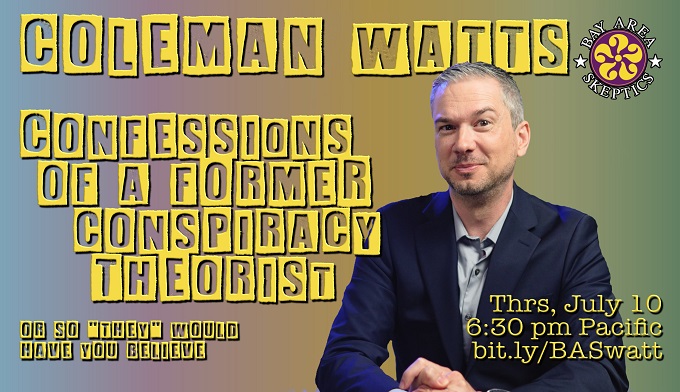
The list of individuals who have managed to escape the rabbit hole of conspiracism is short, but there is an even shorter list of individuals who have then gone on to become popular skeptical podcasters. Former conspiracy enthusiast Coleman Watts discusses why people fall for cults and cons, and how he managed to climb out of the rabbit hole. What’s the best way to talk to a conspiracy theorist to dissuade – and persuade – them from their views? Is misinformation taking over, and if so, why? Coleman Watts will talk about all of this and more in an engaging talk about his experiences debunking the views he used to embrace.
PRESENTER: Coleman Watts is the host of Think This Through on YouTube. He debunks cons, cults, and conspiracies with a humorous flair.
WHEN: 10 July at 6:30 PM Pacific
HOW: Click HERE to watch

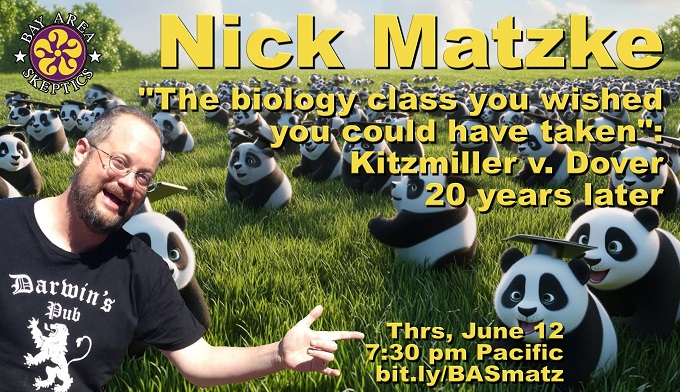
2025 is 100 years after the Scopes Monkey Trial in Dayton, Tennessee, and 20 years after the 2005 Kitzmiller v. Dover court case, in which I participated while working at the National Center for Science Education. The Kitzmiller case included extensive expert testimony on the science of evolution, and the historical development of “intelligent design” and related antievolution efforts. While the case made in 2005 holds up very well, there have been interesting developments in both areas that I will review. These include work on the evolutionary origins of the bacterial flagellum done in a phylogenetic context, and work applying phylogenetic methods to trace the copying history of antievolutionist legislation. I will also reflect on lessons we learned during the case and how they remain relevant today.
PRESENTER: Nick Matzke is a Senior Lecturer and Rutherford Discovery Fellow at the School of Biological Sciences, University of Auckland, New Zealand. From 2004-2007 he was a Public Information Project Director at the National Center for Science Education, and was heavily involved in the 2004-2005 Kitzmiller v. Dover trial in Pennsylvania about the constitutionality of teaching “intelligent design” creationism in public school biology classes.
WHEN: 12 June 2025
HOW: Click HERE

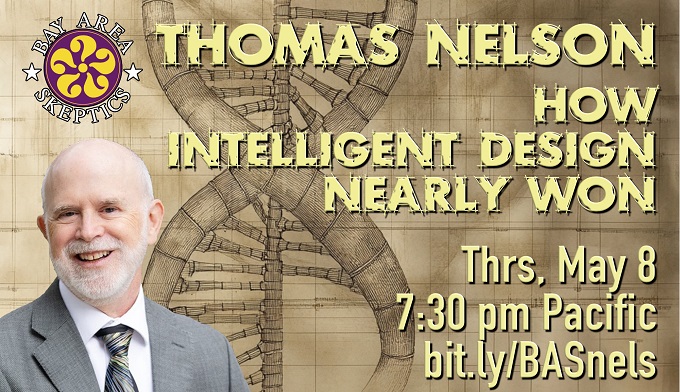
Intelligent Design Theory (ID) is scorned by nearly all professional life scientists. Nevertheless, local and state boards of education throughout the United States have tried to mandate instruction in this “alternative” theory of evolution. Professor Nelson will discuss how ID succeeds politically even as it continues to fail scientifically. The secret to ID’s success draws from its advocates’ “recruitment” of consensus values like freedom and fairness, overshadowing the theory’s scientific shortcomings. Professor Nelson will focus on the communication strategies of ID advocates and opponents and will draw parallels between the ID battle and current controversies over climate change and vaccine resistance.
PRESENTER: Thomas E. Nelson is Professor of Political Science at The Ohio State University in Columbus, Ohio. He received his PhD in social psychology from the University of Michigan in 1992. He is the head of the political psychology PhD program at Ohio State that examines how theories and research methods from psychology help us understand politics, and how the study of politics broadens psychological theory. He is the author of Political Persuasion: The Use of Values in Communication (Oxford University Press, 2024) that explores how political advocates leverage the power of social values to increase support for their causes. The book includes an extensive case study of the ID movement and its opponents, and Prof. Nelson will draw from this material for his presentation.
WHEN: 8 May 2025
HOW: Click HERE

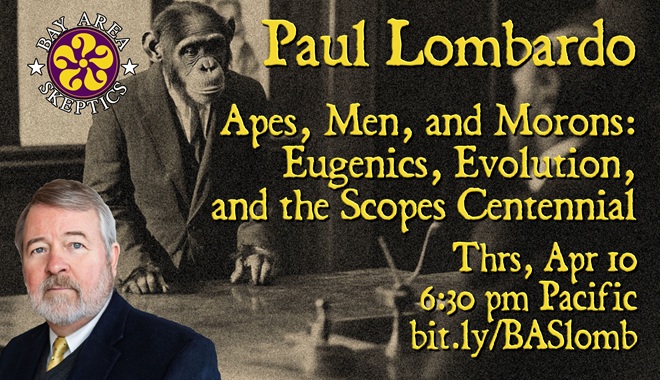
The “Monkey Trial” Centennial provides an opportunity to examine the widespread misunderstanding about how ideas of evolution and eugenics were implicated in the famous Scopes controversy. George William Hunter’s textbook Civic Biology was the focus of the case. It endorsed evolution, a theory “that denies the story of the Divine Creation of man as taught in the Bible” —content prohibited by a 1925 Tennessee law.
The Hunter text also contained a brief discussion of eugenics. In recent years an elaborate mythology has arisen suggesting that the case, and William Jennings Bryan’s advocacy at trial, represented a challenge to eugenics. That claim is not accurate. The teaching of eugenics in its many forms was supported not only by educators, but also by members of the clergy and politicians all across the United States. That support was evident before the Scopes case and continued for decades afterwards, persisting even in full awareness of the Nazi government program that sterilized almost ½ million Germans.
This talk will explain that while William Jennings Bryan rejected the monkey- to-man account of evolution and the cruelties he associated with Darwinian “natural selection,” he made no blanket condemnation of eugenics. To the contrary, Bryan and his wife readily allied themselves with several famous eugenicists and supported eugenic ideology when it coincided with the social policies they favored.
PRESENTER: Paul A. Lombardo is an American legal historian known for his work on the legacy of eugenics and sterilization in the United States. Lombardo’s foundational research corrected the historical record of the 1927 U.S. Supreme Court case of Buck v. Bell. He found Carrie Buck’s school grades and the grades of her child Vivian. He was the last person to interview her, and he discovered the pictures of all three generations of the Buck family. In 2002, he sponsored and paid for a memorial plaque that was installed in Buck’s hometown of Charlottesville, Virginia.
WHEN: 10 April 2025
HOW: Click HERE

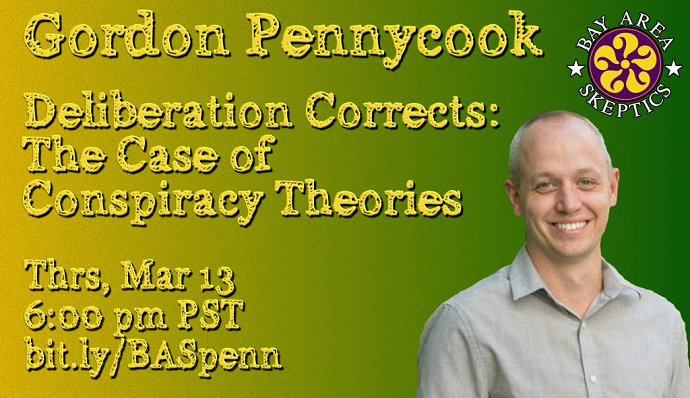
Motivated reasoning – confirmation bias, disconfirmation bias, and related concepts – can get in the way of making well-reasoned decisions. And people certainly are capable of poor reasoning, especially when it comes to conspiracy theories. Psychologists debate whether mistaken ideas are the result of “information deficit”, and even whether it’s counterproductive to provide corrective information. Does providing corrective information push people to dig in rather than change their views? Our research suggests that we needn’t be pessimistic: that providing accurate information can modify views, and that relatively brief evidence-based dialogues with artificial intelligence can change conspiracy theorists’ minds.
PRESENTER: Gordon Pennycook is a Himan Brown Faculty Fellow and Associate Professor in the Department of Psychology at Cornell University. After obtaining his PhD in Cognitive Psychology at the University of Waterloo in 2016, he held a Social Sciences and Humanities Research Council of Canada Banting Postdoctoral Fellowship at Yale University. His expertise is human reasoning and decision-making and he has published over 100 peer-reviewed articles, including in journals such as Nature, Science, Proceedings of the National Academy of Science, Nature Human Behavior, Trends in Cognitive Science, and Psychological Science. He has received several awards, such as the Governor General’s Gold Medal, Poynter Institute’s International Fact-Checking Network “Researcher of the Year”, Vincent Di Lollo Early Career Achievement Award from the Canadian Society for Brain, Behaviour, and Cognitive Science, the Psychonomic Society’s Early Career Award, and the Association for Psychological Sciences “Rising Star” award. He was elected to the Royal Society of Canada’s College of New Scholars, Artists, and Scientists in 2020.
WHEN: 13 March 2025
HOW: Click HERE

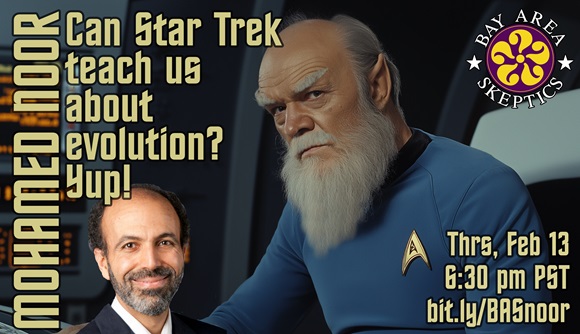
While some people choose to learn about evolution through coursework, a large number of people could be interested in the subject if brought to them wrapped in another subject in which they are already engaged. In this talk, Prof. Noor introduces evolutionary concepts, thinking, and approaches framed using depictions from the Star Trek television franchise.
PRESENTER: Dr. Mohamed Noor is a professor of Biology and the executive vice provost at Duke University. He teaches classes and leads a team conducting research in the broad areas of genetics and evolution. Dr. Noor has held many elected scientific society offices and research journal editorships. He has also been active in education and outreach, and teaches a popular free online course via Coursera on genetics and evolution. Dr. Noor published a book via Princeton University Press that uses Star Trek to teach principles in genetics and evolution: “Live Long and Evolve: What Star Trek Can Teach Us About Evolution, Genetics, and Life on Other Worlds“. He regularly gives classes and talks at various venues using science fiction to teach scientific principles, and he serves as an occasional scientific consultant for the Star Trek Universe, with on-screen credits for Star Trek: Discovery seasons 3 and 4.
WHEN: 13 February 2025
HOW: Click HERE

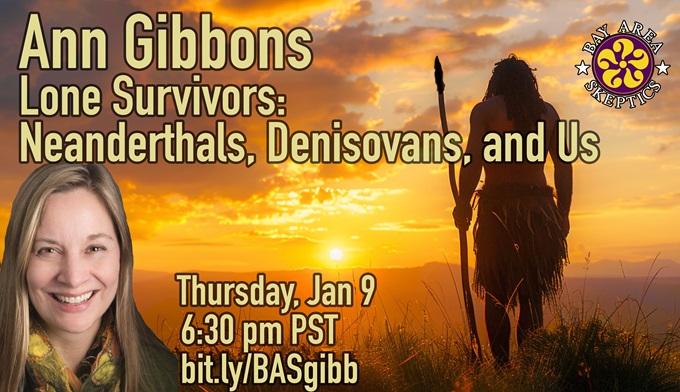
In the past decade, new studies of ancient DNA from fossils have shown that, until as recently as 40,000 years ago, our ancestors shared the planet with two close relatives, the Neanderthals and a mysterious group called the Denisovans. Both of those groups became extinct, but traces of their DNA remain in the genomes of modern humans. Meanwhile, researchers are discovering diverse types of human ancestors who were living at the same time in the same fossil sites millions of years ago, suggesting that we were never alone—that there were always other types of hominins alive in Africa and elsewhere on the planet until recently. Join us for a discussion with Ann Gibbons about new research that has changed perceptions of the Neanderthals, shed new light on the mysterious Denisovans, and our place in the human family tree.
WHO: Ann Gibbons is a contributing correspondent for Science magazine and the author of The First Human: The Race to Discover Our Earliest Ancestors, which was a finalist for the LA Times best science and technology book. She also has taught science writing at Carnegie Mellon University in Pittsburgh, Pennsylvania and written about human evolution for National Geographic, SLATE, Smithsonian magazine and other publications. A graduate of the University of California, Berkeley, she was also a Knight Science Journalism Fellow at Massachusetts Institute of Technology and a science writing fellow at the Marine Biological Laboratory.
She was awarded the 2019 American Geophysical Union’s Perlman Award for Excellence in Science Journalism, the 2018 and 2013 National Academy of Sciences Communication Awards for best magazine/newspaper article; the 2014 Society of American Archaeology Gene S. Stuart Award; and the 2012 Anthropology in Media Award from the American Anthropological Association (AAA) for a decade’s worth of stories on human origins and evolution.
WHEN: 9 January 2025
HOW: Click HERE
